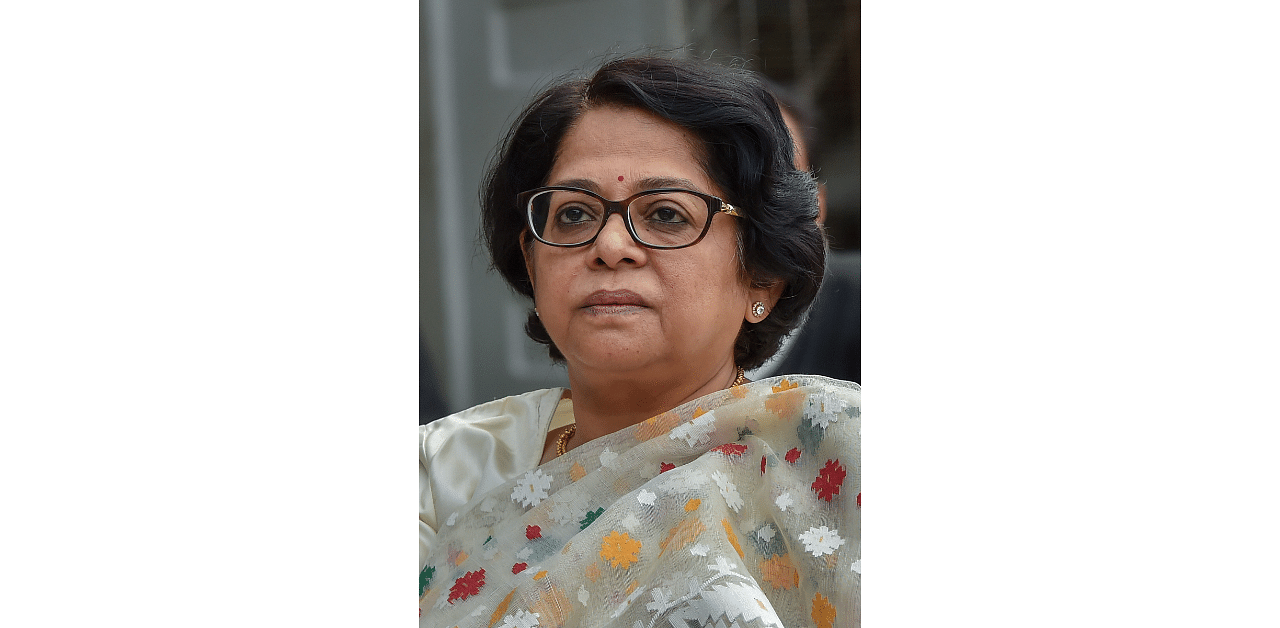
Justice Indu Malhotra, the first woman lawyer to be appointed directly as a judge of the Supreme Court, Friday said that verdict delivered by the apex court decriminalising consensual gay sex was the “most moving moment” as the emotions that swept the courtroom at that time was quite overwhelming.
Justice Malhotra, who is set to retire from judgeship on Saturday, said representation of enough women on the bench will happen when more and more women actively practice and are elevated as judges on the basis of their competence and merit as she believes that there should not be merit less tokenism.
“Society as a whole benefit immeasurably when gender diversity is found even on the bench,” the lady judge said.
Justice Malhotra penned several important verdicts, including her dissenting judgment in the historic Sabarimala Temple case in which she had said a judicial review of religious practices should not be done as courts cannot impose their morality or rationality on the form of worship of a deity,
Besides, she was also a part of the constitution bench which had unanimously held section 497 of the Indian Penal Code (IPC), dealing with the offense of adultery, as unconstitutional and struck down the penal provision.
However, in her farewell speech at a function organised by the Supreme Court Bar Association (SCBA) at the apex court lawns on her last working day, Justice Malhotra recalled the day on which the path-breaking judgment was delivered in the LGBT case.
The judge, who was part of a five-judge constitution bench which had delivered the landmark judgement on September 6, 2019, and held that section 377 of the Indian Penal Code that criminalised consensual gay sex was "irrational, indefensible and manifestly arbitrary”, said the affected parties had broken down with joy and relief after the verdict was pronounced.
In her separate concurring judgment decriminalising consensual gay sex, Justice Malhotra had said that history owes an apology to the members of the LGBT community and their families for the delay in providing redressal for "ignominy" and "ostracism" they have faced through the centuries.
In the today's gathering, She said “Within three months of my elevation, I got the opportunity of being a member of the constitution bench and the most moving moment was on September 6, 2019 when the judgment was delivered by the constitution bench in the LGBT case.”
“As the judgment was pronounced that consensual same sex relationships among adults was not a criminal offence, the emotion which swept through the courtroom was indeed quite overwhelming. We saw the affected parties breakdown with joy and relief since it gave legal legitimacy to their relationships and acceptability to their families many of whom were present in the court,” Justice Malhotra said.
Besides Justice Malhotra, apex court judge Justice R F Nariman, solicitor general Tushar Mehta, SCBA President and senior advocate Vikas Singh and others also addressed the gathering during the physical farewell function, which was first since the Covid-19 pandemic.
Justice Malhotra said, “On the issue of gender representation of women and affirmative action to ensure diversity on the bench, in my opinion there will be enough women on the bench when the distinction between a male judge and a female judge no longer happens.”
“This will happen when more and more women actively practice and are elevated to the bench on the basis of their competence and merit. I do not believe in representation being merely symbolic on the basis of our gender. We do not want merit less tokenism, I believe in meaningful gender parity and not symbolic parity,” she said.
Justice Malhotra referred to the women judges who have been elevated as apex court judges and said the number will grow as more and more women actively pursue her career at the bar.
She termed as “quite overwhelming and daunting” the sheer volume of cases that a judge is required to deal with on a weekly basis.
“Within the great increase in the number of filings I do felt that a disproportionate amount of time of a judge is consumed in reading 100s of SLPs (special leave petition) in a week and sometimes it becomes a struggle to find adequate time to work on one’s judgments,” she said.
“I thing at some point of time the filings would require screening as a large number of matters are purely speculative in nature,” Justice Malhotra said.
She said dispensing justice has certainly been a greatly fulfilling experience and a judge gets a great sense of satisfaction when a long-drawn litigation gets closed and relief is provided to the voiceless and underprivileged sections of the society.
Justice Nariman said that direct appointees to the apex court have had a “very interesting career” and Justice Malhotra was one of them.
Justice Nariman is also a direct appointee and he was appointed as a judge of the apex court in July 2014 when he was a senior advocate.
Mehta said that Justice Malhotra has contributed a lot in the evolution of law and she has been a part of several path-breaking verdicts.
Singh said it is painful to lose a “brilliant judge” like Justice Malhotra and it is high time that the retirement age of apex court judges should be increased from the present 65 years.
Malhotra, who was designated as a senior advocate in 2007, became the first woman lawyer to directly enter the top judiciary as a judge on April 26, 2018. With her retirement, Justice Indira Banerjee remains the only woman judge in the top court.